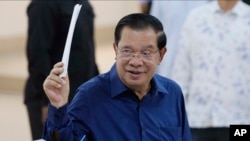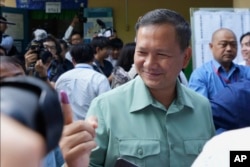A transfer of power from father to son is expected by the end of next month after Prime Minister Hun Sen and his long-ruling Cambodian People’s Party, or CPP, lived up to expectations and extended its grip on power by winning 120 of the 125 seats contested in this past Sunday’s elections.
It was an inevitable result for a national election described by the U.S. Department of State as “neither free nor fair” following the disqualification of the opposition Candlelight Party, or CLP, and a crackdown on the independent media and dissenters opposed to autocratic rulers.
It also said the U.S. had taken steps to impose visa restrictions “on individuals who undermined democracy” and had “implemented a pause of certain foreign assistance programs.” Other countries, including Australia and those in the European Union, have also criticized the electoral process.
Sources said Hun Sen’s eldest son, Hun Manet, would be sworn in as prime minister on August 29, when the National Assembly is scheduled to meet, after Hun Sen, 70, ended speculation about when he would step aside.
“I believe that Manet is more competent than me,” Hun Sen told China’s Phoenix TV on Thursday. “I am the one who makes the biggest sacrifice. Right now, I have an absolute power, but in about a month, I won't have the power to sign any bills the same way as I do today.”
The royalist Funcinpec party did improve its standing and ended this country’s status as a one-party-state. But with just five seats in the National Assembly, its influence will be minimal, while each of the 16 other minor parties could perhaps muster about one percent of the overall vote.
“Since the 1998 election it’s just been the beat down of the opposition and then it’s just intensified. So, this election is just replicating the last, I call it a cakewalk,” said Carl Thayer, emeritus professor at Australia's University of New South Wales.
Thayer said life in Cambodia and antagonized relations with the West and the United States were not expected to improve with Hun Manet, 45, at the helm, despite his background. Hun Manet is a graduate of the U.S. Military Academy at West Point and holds a PhD from Britain’s University of Bristol.
Hun Sen is expected to remain a significant player in Cambodian politics and continue to exert his influence through his senior position in the politburo and as CPP president. Hun Sen has also said he wants to see his grandson become prime minister in the 2030s.
Senior Cabinet ministers are also expected to hand control of their portfolios to their sons, ensuring Cambodia’s political class, ruling business elites and Phnom Penh’s tight relationship with Beijing remain unchanged.
“If Hun Sen is 90 percent pro-China, then Hun Manet might be around 85 percent,” Thayer said.
Bradley Murg, distinguished senior research fellow with the Cambodian Institute for Cooperation and Peace, echoed Thayer’s sentiments. Murg said little will change under Hun Manet, who is also a four-star general and chief of the Royal Cambodian Army.
“Barring an act of God, Hun Manet will become prime minister in the next few weeks and with that comes a generational change in leadership and expected improvements in governance in certain ministries that will be quite positive,” he told VOA.
“At the same time the challenges and the concerns of various civil society actors – there is no reason to expect any change in the status quo.”
That also means issues ranging from Chinese construction of a naval base at Ream on the south coast, and the jailing of political activists including former opposition leader Kem Sokha, trade unionist Chhim Sithar and American-Khmer lawyer Theary Seng, will remain.
The United States has called for their release and on July 13, the United Nations Working Group on Arbitrary Detention found Theary Seng – convicted of treason and jailed for six years for two Facebook posts – had been “arbitrarily detained in violation of international law.”
“You’ve got Americans being held illegally in Russia; North Korea – that American serviceman who’s crossed the border – and now this Cambodian case,” Thayer said. “It’s not going to be an easy ride for Cambodia. This is not the time to keep an American illegally detained.”
Election Day passed quietly after lackluster campaigning bereft of the CLP. A 29-year-old Phnom Penh-based writer said, “It is not as exciting as the election a decade ago when we had an opposition running their campaign and there were a lot of people joining in.”
“Whether there is a new prime minister or we keep the old one, there will be no difference,” he said.
A 27-year-old clerk added, “There was no trouble at my polling station… I think Hun Manet has been given a hot stone task, with leadership being passed to the next generation and it might not be easy to hold, but I believe he can do it. It might take a long time to navigate.”
Security was tight with 100,000 police and security personnel deployed across the country amid government fears of an opposition-inspired boycott and protest vote through spoiled ballot papers.
By early Monday, the National Election Committee claimed 440,000 invalid ballots had been counted, compared with 590,000 in 2018. Voter turnout reached 84.58 percent, slightly higher than 83.2 percent of registered voters five years ago, it said.
Astrid Noren-Nilsson is a senior lecturer for the Center for East and South-East Asian Studies at Sweden’s Lund University. Noren-Nilsson told VOA that Hun Manet had maintained a low profile throughout the campaign and would now work to maintain continuity.
“I think that Cambodia is gradually becoming habituated to elections without competition and disciplined, really, into a new normal that is taking hold for the foreseeable future,” she said. “The election is all about sanctifying this generational transition with a popular vote.”
Sreynat Sarum contributed to this report.









